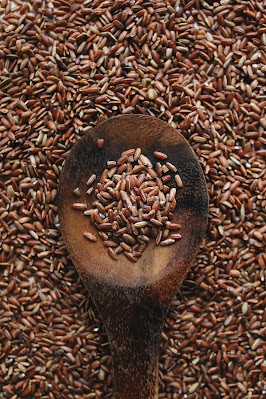Lifestyle: The Benefits of Fiber on your Digestive System
After a few months of taking prescription pills and over-the-counter Lactaid pills, I decided to take matters into my own hands. In my search for a holistic cure, I found the GERD diet, Mediterranean diet, and Alkaline diet. All of these diets contained similar foods, fruits, seeds, nuts, and whole grains. For many years I have been eating off of these food pyramids, and two foods in particular have benefited me in a mighty way, both of which contain fiber. These foods are whole grains, and seeds.
What is Fiber?
"Fiber is a type of carbohydrate that the body can’t digest. Though most carbohydrates are broken down into sugar molecules called glucose, fiber cannot be broken down into sugar molecules, and instead it passes through the body undigested. Fiber helps regulate the body’s use of sugars, helping to keep hunger and blood sugar in check." Fiber | The Nutrition Source | Harvard T.H. Chan School of Public Health
If Fiber can't be digested, how can it help my digestive system?
There are two varieties of fiber, soluble and insoluble. Soluble fiber dissolves in water and creates a gel like consistency. It is in foods like oatmeal, chia seeds, barley, beans, and apples. Soluble fiber can help lower cholesterol and glucose levels.
Insoluble fiber does not dissolve in water, and is in foods like whole wheat, quinoa, brown rice, spinach, and seeds. Insoluble fiber can help food move through your digestive system.
3 great sources of fiber:
- Flax Seeds- Flax seeds are rich in insoluble and soluble fiber. "Just 1 tablespoon (7 grams) of ground flaxseed packs 2 grams of fiber, which is around 5% and 8% of the daily recommended intake for men and women, respectively" Flaxseed: 9 Health Benefits and How to Eat (healthline.com).
- Oatmeal- Oatmeal, like flaxseeds, also contain soluble fiber. According to EatingWell.com "Oats contain a special type of soluble fiber called beta-glucan," says Michalczyk. "Beta-glucan forms a gel-like consistency in the gut and helps to keep things moving in your digestive tract and keep you regular." This helps with bulking up your stool, making it easier for your bowel movement later." https://www.eatingwell.com/article/7996442/what-happens-to-your-body-when-you-eat-oatmeal-every day/#:~:text=%22Oats%20contain%20a%20special%20type,for%20your%20bowel%20movement%20later.
- Sesame Seeds (Black and White)- According to healthline.com, 3 tablespoons of sesame seeds provide 12% of fiber of the recommended dietary intake which is important for your digestive health. https://www.healthline.com/nutrition/sesame-seeds#TOC_TITLE_HDR_2
If you want to start implementing fiber into your diet, I suggest starting off with whole-grain breads or oatmeal. Two of my favorite brands of multigrain breads are The Arnold brand 12 Grains and Seeds bread and Dave's Killer Bread Organic Good Seed Bread. These can be found at most grocery store. If you are currently taking any medication or suffering from disease, check-in with your doctor before introducing new foods or supplements. In addition, make sure to eat fiber in moderation (serving size portions and following the food pyramid), as too much fiber can cause constipation.
Be Encouraged,
Noelani


.jpg)

Great information! I love using flax and chia seed to try and up my fiber.
ReplyDeleteThank you, Nikki. Thanks for all of your support. We'll have to try chia seeds.
Delete